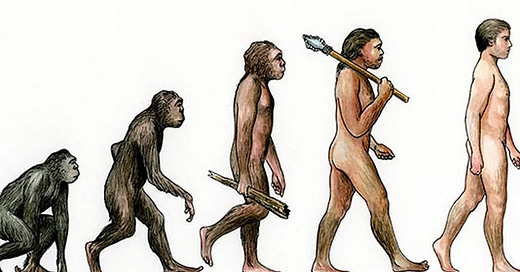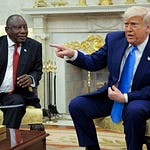History repeats. But it doesn’t have to.
For 8,000 years, civilizations have risen and fallen in predictable cycles. Twenty-six times, we’ve watched the same movie with different actors.
We build. We extract. We concentrate power. We collapse.
Rinse and repeat.
Most leaders think we need complex solutions for complex problems. They’re wrong.
The Science of Becoming isn’t about predicting the future with fancy mathematical models. It’s not about drawing elaborate bioregional maps. And it’s definitely not about forming committees and working groups to discuss the metacrisis.
It’s about seeing the patterns that have always been there, and choosing differently.
The pattern is hiding in plain sight
When we look back at history through the lens of Cliodynamics (the mathematical study of historical patterns), we see something remarkable: civilizations follow predictable boom-bust cycles.
Resource concentration. Elite overproduction. Social stratification. Collapse.
When we look forward through the lens of Futures Studies, we imagine alternative possibilities. Different ways of organizing. Different ways of being.
The Science of Becoming is just connecting these dots.
Looking back. Looking forward. Making a choice.
Your city already knows what to do
The municipality you live in right now is the perfect laboratory for change. Not Washington. Not Silicon Valley. Your city.
Cities operate at human scale. They map to natural boundaries. They have the legal authority to experiment and the practical ability to coordinate.
The most powerful act of revolution is to help your city remember its history while imagining its future.
That’s it. That’s the whole science.
Material vs. Mycelial: Choose your consciousness
We’ve been living in Material Consciousness for centuries. Extract, own, hoard, compete.
The alternative isn’t complicated. It’s how forests work. It’s how fungi works. Connect, share, circulate, collaborate.
Cities are optimized for resource distribution. Big deal. Nature has been doing the same for millennia.
Mycelial networks move nutrients and information to where they’re needed. No central planning committee. No invisible hand of the market. Just elegant, distributed intelligence.
Your city can work this way too.
The secret switch is already built in
The oldest recipe for change isn’t complicated: thesis meets antithesis, creates synthesis. Old system, meet challenger. Together, you become something new.
Here’s the thing about dialectical processes we’ve just described: the seed of the new system is already contained within the old one.
Technofeudalism is the thesis in the metacrisis. That’s the bad news. The good news is that it creates the tools for its own replacement. Digital networks designed for extraction can be repurposed for connection. Monitoring systems designed for control can be repurposed for coordination.
Bioregionalism is the antithesis.
The switch is there. We just need to flip it.
Start in your neighborhood
The Science of Becoming doesn’t require a Ph.D. It requires attention.
Pay attention to historical patterns in your own community. Pay attention to emerging possibilities. Pay attention to where power is concentrated and where it could be distributed.
Then act accordingly.
Learn your land’s story from those who’ve lived it longest. Indigenous knowledge isn’t supplementary—it’s foundational. (Here, indigenous means that which originates or occurs naturally in a particular place.) The future doesn’t start with tomorrow; it starts with 8,000 years of yesterday.
Sit with elders before hosting workshops. Map your watershed with those who’ve stewarded it for generations. Understand the patterns before you try to change them.
Then, and only then, host a neighborhood futures workshop. Connect with municipalities (yes, really) who’ve done this historical homework. Because looking forward without looking back isn’t visionary—it’s just amnesia.
The Science of Becoming demands sequence: deep history first, imagined futures second. Break this order at your peril.
The simple truth
We don’t need to be passive observers of civilizational collapse.
We don’t need to wait for someone else to solve the metacrisis.
The Science of Becoming offers a surprisingly simple path forward: See the patterns. Imagine alternatives. Act locally. Connect globally.
That’s it.
History doesn’t have to repeat.
But only if we choose to interrupt the 8,000 year pattern.
Author’s Note
This essay is a teeny glimpse into what I’m developing as a comprehensive theoretical framework called “The Science of Becoming.” This thinking might appear far too simple for today’s complex challenges. That’s because I’ve worked really hard to make it as simple as possible. The thinking is supported by rigorous academic research integrating Hegelian dialectics, Cliodynamic analysis of historical cycles, and methodologies from Futures Studies.
I am currently crowdfunding to complete a doctoral thesis that scientifically elaborates on the concepts presented in this brief essay. The thesis will provide mathematical models of historical patterns across 26 civilizational collapses, develop methodological frameworks for integrating historical analysis with futures literacy, and outline practical implementation pathways through transformation guided by municipalities.
This is, in many ways, an existential paper. I don’t say that lightly. Those currently in positions of power—whether in government, finance, or technology—are struggling to navigate what we call the metacrisis. They’re applying Material thinking to post-Material challenges. This thesis aims to provide decision-makers with a coherent framework for understanding both the historical patterns driving our current predicament and the emergent possibilities for transcending it.
This is not merely an academic paper that will lie on the shelf gathering dust. I believe this work has profound practical implications for how we organize our societies during and after this critical transition period. The paper will offer a map for navigating from Material to Mycelial Consciousness. More importantly, the paper will show how human coordination systems have evolved in parallel with the evolution of our consciousness. Most importantly, the paper will show how we accomplish this transition, not through utopian idealism, but through pragmatic understanding of historical cycles and future possibilities.
If you recognize the importance of developing a framework like this, please consider supporting the completion of this thesis. Your contribution will fund not just academic research, but a practical roadmap for those guiding our collective future during these turbulent times.
To learn more or contribute to this work, please see (and comment on) the thesis outline, visit https://thesis.michaelhaupt.com/cf, or contact me directly at hello@michaelhaupt.com.
With gratitude,
Michael Haupt
References
Hegelian Dialectics: https://en.wikipedia.org/wiki/Dialectic and Deep Dive
Technofeudalism as Thesis: https://en.wikipedia.org/wiki/Technofeudalism and Deep Dive
Bioregionalism as Antithesis: https://en.wikipedia.org/wiki/Bioregionalism and Deep Dive
Cliodynamics, the discipline that treats history as science: https://en.wikipedia.org/wiki/Cliodynamics and Deep Dive
Futures Studies, the systematic exploration of possible futures: https://en.wikipedia.org/wiki/Futures_studies and Deep Dive
Metacrisis: a crisis of belief systems, rather than merely a crisis of events or circumstances: https://en.wikipedia.org/wiki/Polycrisis#Metacrisis and Deep Dive














Share this post